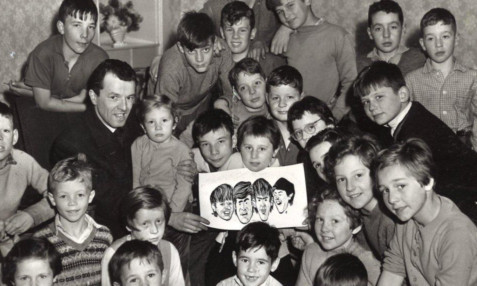Life was tough in early 19th century Dundee.
As more families moved into the newly industrialised city in search of work in the textile industry, slum housing, meagre diet, long hours, poor working conditions and little sanitation took their toll on workers.
Life expectancy was lower than the countryside, resulting in large numbers of families with one parent or none.
For orphaned children there was little hope other than life on the streets or a bed in the poorhouse.
That all changed at 10am on September 18, 1815, when nine boys and 12 girls became the first residents of Dundee Orphan Institution.
The original orphanage in Paradise Road was established by the charity then known as The Dundee Society for Educating Orphans, Fatherless Children and the Children of the Industrious Poor.
Two-hundred years later, Carolina House Trust, as the charity has been known since 1961, continues to provide care and support to children and young people in and around the city of Dundee.
The desperate need within the city was recognised on February 9, 1815, when four local gentlemen first met in the Baker’s Room of the Trades Hall in Dundee to discuss the opening of an orphanage. Support and funding grew from there.
For many years it was thought that the loss of 17 lives in the Tay Ferry Disaster of May 28, 1815, was the reason for the orphanage being established. But research later revealed that the disaster actually happened months after the founding of the Dundee Orphan institution.
The aims of the society were simple – to assist “the more helpless and destitute of the community orphans and fatherless children” while striving to educate children whose parents worked in Dundee’s textile mills, as well as the city’s shipyards and whaling industry.
Much of that old industry has, of course, gone, and the modern economic fabric of Dundee is very different.
But according to the modern-day chief executive of the Carolina House Trust, Steve Clark, the fundamental aims of the organisation to care for the less fortunate in Dundee and its environs remain the same.
In an interview with The Courier at the Carolina House Trust offices in Dundee Technology Park, Mr Clark, who has more than 29 years of social work experience, said: “The needs of the young people we look after today are not dissimilar to 200 years ago. They are the modern day equivalent of the industrial poor, as they called them in 1815.
“We assist young people who are in care due to their circumstances at home. And that’s usually to do with neglect, or it could be abuse.
“Largely the children we look after have been removed from their own homes due to their parents’ inability to look after them. So we supply direct care in terms of foster care. But we also provide after care as they leave.
“Though we do less of the educating in terms of direct schooling of young people, we still have an educational function in terms of teaching young people to have the life skills to go on and exist in their own accommodation once they’ve moved on from being in care.”
Carolina House Trust provides individual packages of care and support to young people with complex needs from anywhere in Scotland, although the key priority areas it offers a service to are Dundee City, Angus, Perth & Kinross and Fife.
With a team of 31 including administration staff, social work and support workers, it co-ordinates foster care, funded by whatever local authority pays for the placement, and provides training for foster carers, and also provides supported accommodation for a small number of young people who have left care, funded by direct grant from Dundee City Council. Recent figures show there are 605 ‘looked after’ children in Dundee.
The trust commissioned journalist Wendy Glass to research and write the book ‘200 years of Carolina House Trust’ because there were so many contradictory stories on the history of the trust.
It was also useful to point out the great and the good of Dundee who have been involved over the years.
Mr Clark noted the Dundee orphan institution never got the national recognition of institutions like Barnardos and the Aberlour Trust. And yet it had been around longer and the small close knit team had advantages.
Of course, the philosophy behind being a social worker is that you should work to put yourself out of a job. But with the new Children and Young Persons Bill extending the time that local authorities are responsible for young people being looked after, he saw the trust’s role expanding in that direction.
“The fact is that what we do is as required today as it was 200 years ago. It would be nice to think there would be a point in the future when that wouldn’t be the case.
“But the people who set this up would probably be saying the same thing 200 years ago.”
